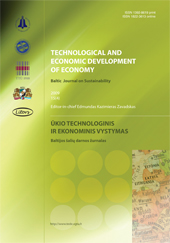An Approach of Multi-Agent Control of Bio-Robots Using Intelligent Recognition Diagnosis of Persons with Moving Disabilities
An Approach of Multi-Agent Control of Bio-Robots Using Intelligent Recognition Diagnosis of Persons with Moving Disabilities
Author(s): Vitalij Denisov, Dalė Dzemydienė, Darius Drungilas, Arūnas Andziulis, Antanas Andrius BielskisSubject(s): Economy
Published by: Vilnius Gediminas Technical University
Keywords: multiple agent system control; bio-robots; distributed information systems; knowledge representation techniques; fuzzy logic; neural networks; Petri nets
Summary/Abstract: The aims of this research are focused on the construction of intellectualized equipments for people with moving disabilities to help them in sustainable integration into environment. The problem is to reveal main components of diagnosis of disabled persons, as well as to develop decision making models which are integrated into the control mechanisms of the special equipments, that are assigned to the class of bio-robots. This paper analyses the approach of the construction of such type of bio-robots with possibilities to integrate different knowledge representation techniques for the development of the reinforcement framework with multiple cooperative agents for the recognition of the diagnosis of emotional situation of disabled persons. Large-scale of multi-dimensional recognitions of emotional diagnosis of disabled persons often generate a large amount of multi-dimensional data with complex recognition mechanisms, based on the integration of different knowledge representation techniques and complex inference models. Sensors can easily record primary data; however, the recognition of abnormal situations, cauterisation of emotional stages and resolution for certain type of diagnosis is an oncoming issue for bio-robot constructors. The research results present the development of multi-layered model of this framework with the integration of the evaluation of fuzzy neural control of speed of two wheelchair type robots working in real time by providing moving support for disabled individuals. An approach for representation of reasoning processes, using fuzzy logical Petri nets for evaluation of physiological state of individuals is presented. The reasoning is based on recognition of emotions of persons during their activities.
Journal: Technological and Economic Development of Economy
- Issue Year: 2009
- Issue No: 3
- Page Range: 377-394
- Page Count: 18
- Language: English

